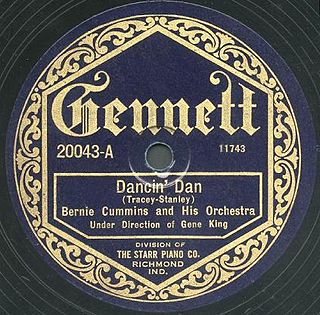
Decca Records is a British record label established in 1929 by Edward Lewis. Its US label was established in late 1934 by Lewis, Jack Kapp and Milton Rackmil, who later became American Decca's president too. In 1937, anticipating Nazi aggression leading to World War II, Lewis sold American Decca, and the link between the UK and US Decca label was broken for several decades. The British label was renowned for its development of recording methods, while the American company developed the concept of cast albums in the musical genre.
RCA Records is an American record label owned by Sony Music Entertainment, a subsidiary of Sony Corporation of America.

MCA Records was an American record label owned by MCA Inc., which later became part of Universal Music Group.

Brunswick Records is an American record label founded in 1916.

Gennett Records was an American record company and label in Richmond, Indiana, United States, which flourished in the 1920s and produced the Gennett, Starr, Champion, Superior, and Van Speaking labels. The company also produced some Supertone, Silvertone, and Challenge records under contract. The firm also pressed, under contract, records for record labels such as Autograph, Rainbow, Hitch, Our Song, and Vaughn; Gennett also pressed records for the Ku Klux Klan (KKK). Gennett produced some of the earliest recordings by Louis Armstrong, King Oliver, Bix Beiderbecke, and Hoagy Carmichael. Its roster also included Jelly Roll Morton, Blind Lemon Jefferson, Charley Patton, and Gene Autry.

MGM Records was a record label founded by the Metro-Goldwyn-Mayer film studio in 1946 for the purpose of releasing soundtrack recordings of their musical films. It transitioned into a pop music label that continued into the 1970s. The company also released soundtrack albums of the music for some of their non-musical films as well, and on rare occasions, cast albums of off-Broadway musicals such as The Fantasticks and the 1954 revival of The Threepenny Opera. In one instance, MGM Records released the highly successful soundtrack album of a film made by another studio, Columbia Pictures's Born Free (1966).

American Record Corporation (ARC), also referred to as American Record Company, American Recording Corporation, or ARC Records, was an American record company in operation from 1929 to 1938, and again from 1978 to 1982.
A cast recording is a recording of a stage musical that is intended to document the songs as they were performed in the show and experienced by the audience. An original cast recording or OCR, as the name implies, features the voices of the show's original cast. A cast recording featuring the first cast to perform a musical in a particular venue is known, for example, as an "original Broadway cast recording" (OBCR) or an "original London cast recording" (OLCR).

Bluebird Records is an American record label best known for its low-cost releases, primarily of children's music, blues, jazz and swing in the 1930s and 1940s. Bluebird was founded in 1932 as a lower-priced subsidiary label of RCA Victor. Bluebird was noted for what came to be known as the "Bluebird sound", which influenced rhythm and blues and early rock and roll. It is currently owned by RCA Records parent company Sony Music Entertainment.
Philips Records is a record label founded by the Dutch electronics company Philips and the Dutch-American largest record label company Universal Music Group. It was founded as Philips Phonographische Industrie in 1950. In 1946, Philips acquired the company which pressed records for British Decca's Dutch outlet in Amsterdam.

Record collecting is the hobby of collecting sound recordings, usually of music, but sometimes poetry, reading, historical speeches, and ambient noises. Although the typical focus is on vinyl records, all formats of recorded music can be collected.
"Don't Let the Stars Get in Your Eyes" is a country song about a man away from home who is worried that his paramour may unwittingly stray from their relationship. It was written by Winston L. Moore and published in 1952. The song has been recorded in many different styles by many performers, with Perry Como's version hitting number 1 in both the US and UK.
Varèse Sarabande is an American record label, owned by Concord Music Group and distributed by Universal Music Group, which specializes in film scores and original cast recordings. It aims to reissue rare or unavailable albums, as well as newer releases by artists no longer under a contract. The label's name was derived from combining French-born composer Edgard Varèse's last name with the musical term sarabande, a slow Spanish dance.
On August 1, 1942, the American Federation of Musicians, at the instigation of union president James C. Petrillo, began a strike against the major American record companies because of disagreements over royalty payments. Beginning on midnight, July 31, 1942, no union musician could make commercial recordings for any commercial record company. That meant that a union musician was allowed to participate on radio programs and other kinds of musical entertainment, but not in a recording session. The 1942–1944 musicians' strike remains the longest strike in entertainment history.

Jay Mayo "Ink" Williams was a pioneering African-American producer of recorded blues music. Some historians have claimed that Ink Williams earned his nickname by his ability to get the signatures of talented African-American musicians on recording contracts, but in fact it was a racial sobriquet from his football days, when he was a rare Black player on white college and professional teams. He was the most successful "race records" producer of his time, breaking all previous records for sales in this genre.
Budget albums were low-priced vinyl LPs of popular and classical music released during the 1950s to 1970s consisting either of previously released material or material recorded especially for the line. Prices ranged from as low as 59 U.S. cents to $2.98. In the UK Pickwick Records' Top of the Pops record series, which operated between 1968 and 1985, was the most successful budget album range.
Quintessence Records started in 1976. Quintessence was formed by Pickwick International Inc. as a budget label. Pickwick’s trademark for Quintessence was filed on December 10, 1976 with the initial Q made to look like a clef symbol. The label was devoted to the licensed reissue of historic classical recordings. The idea was printed on the record jackets: "Critically acclaimed recordings of the basic repertoire which belong in every library of great music" and also promised these were "Carefully remastered from the original master tapes, recut on the latest Neumann lathes and pressed on virgin vinyl." R. Peter Munves was the executive responsible for the label. Munves had earlier worked for Columbia Records and RCA Records classical music divisions. He said to Time magazine in 1971 “You can call me the P.T. Barnum of the classics”.

Crown Records was a record company and dime-store label that existed from 1930 to 1933 in New York City. Its catalogue included music by Eubie Blake and Fletcher Henderson. Known as the label offering "Two Hits for Two Bits" proudly printed on their sleeves, Crown's discs sold for 25 cents.
Elliott Everett "Eli" Oberstein was an American record producer and music business executive who established the influential Bluebird record label in the 1930s and owned a succession of small labels in the 1940s and 1950s.

Broadway Records was the name of an American record label in the 1920s and 1930s. Broadway's records were first manufactured in the early 1920s by the Bridgeport Die and Machine Company of Bridgeport, Connecticut. Most of the early issues were from masters recorded by Paramount Records. Starting in 1924, masters from the Emerson and Banner appeared on Broadway.











